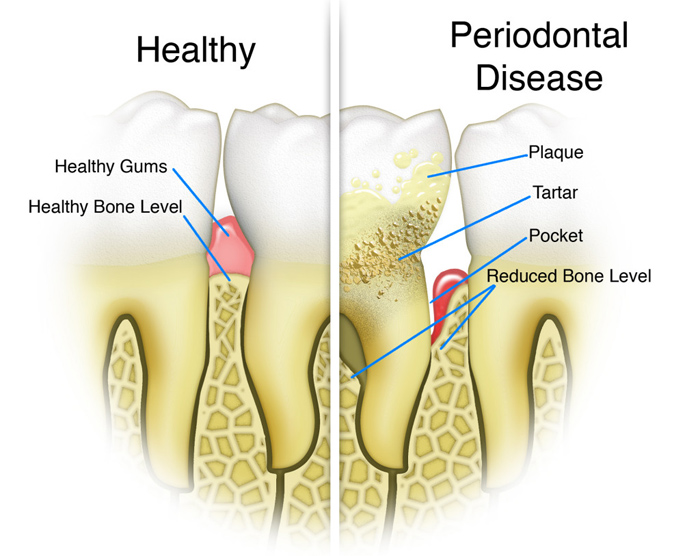Here at the Park Clinic we have a team of highly skilled and experienced Periodontists who have completed advanced training and postgraduate qualifications in the treatment of gum disease.

For the past 20 years the practice has been a busy referral centre for patients with gum disease directed to us from other dentists who wish their patients to receive Specialist Periodontal Care. Our specially selected hygienists are very experienced in the care of and long term maintenance of patients with advanced gum disease.
If you have been referred to The Park Clinic by your dentist, we will arrange a consultation appointment so that we can examine your gums in detail. We will ask you to complete a comprehensive medical history form and then we take detailed measurements of all your teeth to establish the exact sites, extent and nature of your gum disease.


"Periodontal disease is a silent problem but if we detect it at an early stage it can be prevented and easily treated." Dr. Amit Gadhavi
We will discuss your concerns and inform you of treatment options and costs and give you a written treatment plan.
NB: If you are a dentist referring a patient, wherever possible please send any relevant radiographs with your referral letter (or use our online referral form). These will be returned to you on completion of the patient's treatment when the patient will be referred back to your care for the completion of any restorative work that may be required. A full report, along with supporting treatment radiographs will be sent to you.
X-ray images of your teeth are a valuable tool for us in assessing the extent and nature of your disease. We may need to take additional X-rays to those that we have obtained from your dentist.
We will then send a detailed report to your dentist.
Many patients contact us directly for periodontal advice and you do not need to be referred by a dentist


"Our aim is to help our patients keep their teeth and gums healthy by giving them the best possible professional treatment and advice. However any type of periodontal treatment requires that the patient continues to observe good daily care at home." Dr. Pradeep Nair

Gum disease (periodontitis) is a very common problem affecting more than 45% of UK adults. It has known links to other serious conditions such as heart disease, yet most people are often unaware they have it. Gum disease is preventable and treatable if caught early. If untreated it will inevitably lead to loss of teeth.
There are two main stages of gum disease:
Gingivitis is the early stage of gum disease. Gingivitis is inflammation of the gums and is caused by the bacteria in plaque which is the sticky and often colourless film that constantly forms on your teeth. If untreated, this inflammation can extend to the underlying tissues and bone that support the teeth. However, if treated at an early stage the inflammation and disease can be reversed. Treatment involves thorough, professional cleaning both above and below the gum line and more effective oral hygiene techniques. Depending on the severity and extent of the gingivitis, this will be carried out by either a Periodontist or a Hygienist.
If untreated, gingivitis can develop into periodontitis. Continued inflammation causes irreversible damage to the supporting bone and fibres that hold teeth in place. Pockets form around the teeth and traps more plaque beneath the gum line. These deep pockets are difficult to access with normal tooth brushing and the plaque below the gum line will harden into tartar on the root surfaces causing further inflammation. Eventually, the fibres and bone supporting your teeth are destroyed to an extent which may cause your teeth to move or loosen. This can affect how well you can chew your food and severely affected teeth may need to be extracted by your dentist.
The early stages of gum disease can often be reversed with effective brushing and flossing. Good daily oral hygiene will help keep plaque from building up.
Regular professional cleaning is the only way to remove plaque that has built up and hardened into tartar. Your Periodontist or Hygienist will clean or "scale" your teeth to remove the tartar above and slightly below the gum line.
For deeper pockets it is necessary to undergo deeper, more extensive cleaning called Root Planing which is usually carried out under Local Anaesthetic by one of our periodontists.
If your gum condition is more severe or does not fully resolve with root planing and cleaning, you may require surgery. In certain cases it maybe necessary for antibiotics to be taken as part of the gum treatment in order to gain more healing following the therapy.
Remember, after successful treatment, you still need to take extra care of your gums to make sure disease does not return. Periodontal disease may not always be cured, depending on the severity of the disease, but the aim of treatment is to slow the rate of progression of the disease and eventually stabilise the disease. This requires a high level of oral hygiene care from the patient and regular maintenance from your dental professional. Here at The Park Clinic, our periodontists will develop an individual maintenance programme, where we will monitor your gum condition, review and assess your gum status on a regular basis and coordinate treatment with our hygiene team with regard to your ongoing long term care.
Further information can be obtained at the following websites:

